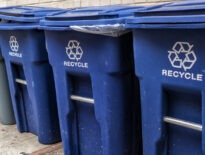The Clean Air Action Network, based in Glens Falls/Warren County, NY, and ILSR conducted a webinar focused on reuse enterprises and their potential for local and regional economic growth. Presentations featured model enterprises, networks and policies.
A recording of the presentations is available here on YouTube.
It is also available at http://www.cleanairactionnetwork.org
Additional Information About the Webinar, Which is Called “Reuse & Repair: Creating New Jobs and Enterprises Through Zero Waste”
The webinar was hosted by the Zero Waste Committee of Warren County, NY, a project of the Clean Air Action Network (CAAN) of Glens Falls, and it focused on local economic growth through reuse and repair enterprises and programs.
Neil Seldman, PhD, director of the Waste to Wealth Initiative at the Institute for Local Self-Reliance, and a founding member of CAAN, moderated the webinar panel, which featured four of the country’s leading repair and reuse entrepreneurs, researchers and activists:
• Elizabeth Knight, based in the mid Hudson Valley, is the co-author of The Repair Revolution: How Fixers are Transforming Our Throw Away Economy.
• Mark Foster is the founder and director of Second Chance, Baltimore’s thriving building deconstruction and resale social enterprise.
• Mary Lou Van Deventer operates Urban Ore, Inc., the iconic materials recovery enterprise started at the Berkeley (CA) landfill. She is also an environmental writer.
• Jacob Hannah is the coordinator of ReUse Corridor, a network of businesses, universities and local and state economic development agencies serving rural Appalachian communities in West Virginia, Ohio and Kentucky.
Around the country, social enterprises—businesses with a social mission—are turning reuse and repair, and deconstruction into engines of job creation and job training for hard-to-employ populations, while also achieving meaningful environmental goals. Some of these businesses have been credited with reducing the recidivism of formerly incarcerated employees to practically zero.
These businesses make a lot of economic sense because the most valuable fraction of the municipal solid waste stream (what we put in our garbage can or the dumpster) consists of goods and materials that can be reused (with or without repair). The average value of repairable items that are now being thrown away is estimated at $550 per ton, yet we are paying around $70 per ton to get this stuff incinerated or landfilled, plus the cost of collection and trucking!
Items for reuse (and sometimes repair) include appliances, building materials, electronics, furniture and other furnishings, tools, housewares, office and art supplies, books, and clothing. Deconstruction involves taking apart unwanted buildings for their salvage value, rather simply demolishing them without regard to the value of their component parts. Deconstruction saves money and resources, provides employment, and can greatly reduce the quantity of materials destined for construction and demolishment landfills, which can become sources of pollution and nuisances that impact the quality of life in host communities.
Photo credit: Photo by Jon Tyson on Unsplash





